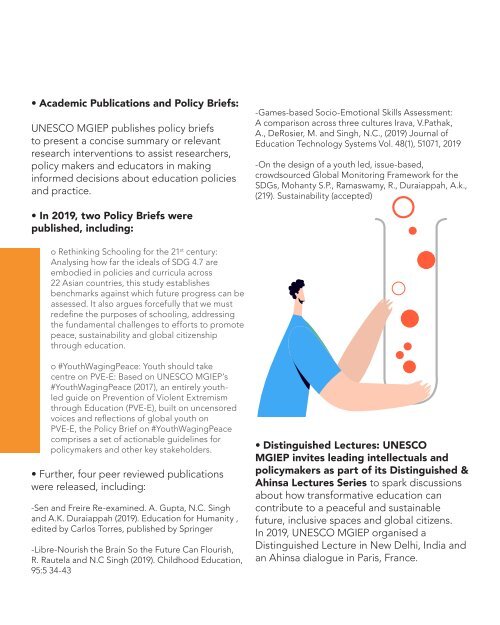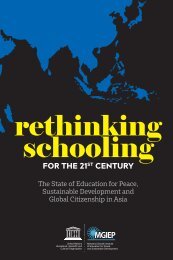UNESCO MGIEP's Annual Report 2019
2019 was a critical year for the Institute - with various products rolling out to pilot and implementation stage. Read the Institute's Mission-based Annual Report on the impact the Institute made during the year, as it works towards achieving the UN SDG 4, Target 7.
2019 was a critical year for the Institute - with various products rolling out to pilot and implementation stage. Read the Institute's Mission-based Annual Report on the impact the Institute made during the year, as it works towards achieving the UN SDG 4, Target 7.
Create successful ePaper yourself
Turn your PDF publications into a flip-book with our unique Google optimized e-Paper software.
ANNUAL REPORT <strong>2019</strong><br />
• Academic Publications and Policy Briefs:<br />
<strong>UNESCO</strong> MGIEP publishes policy briefs<br />
to present a concise summary or relevant<br />
research interventions to assist researchers,<br />
policy makers and educators in making<br />
informed decisions about education policies<br />
and practice.<br />
• In <strong>2019</strong>, two Policy Briefs were<br />
published, including:<br />
o Rethinking Schooling for the 21 st century:<br />
Analysing how far the ideals of SDG 4.7 are<br />
embodied in policies and curricula across<br />
22 Asian countries, this study establishes<br />
benchmarks against which future progress can be<br />
assessed. It also argues forcefully that we must<br />
redefine the purposes of schooling, addressing<br />
the fundamental challenges to efforts to promote<br />
peace, sustainability and global citizenship<br />
through education.<br />
o #YouthWagingPeace: Youth should take<br />
centre on PVE-E: Based on <strong>UNESCO</strong> MGIEP’s<br />
#YouthWagingPeace (2017), an entirely youthled<br />
guide on Prevention of Violent Extremism<br />
through Education (PVE-E), built on uncensored<br />
voices and reflections of global youth on<br />
PVE-E, the Policy Brief on #YouthWagingPeace<br />
comprises a set of actionable guidelines for<br />
policymakers and other key stakeholders.<br />
• Further, four peer reviewed publications<br />
were released, including:<br />
-Sen and Freire Re-examined. A. Gupta, N.C. Singh<br />
and A.K. Duraiappah (<strong>2019</strong>). Education for Humanity ,<br />
edited by Carlos Torres, published by Springer<br />
-Libre-Nourish the Brain So the Future Can Flourish,<br />
R. Rautela and N.C Singh (<strong>2019</strong>). Childhood Education,<br />
95:5 34-43<br />
-Games-based Socio-Emotional Skills Assessment:<br />
A comparison across three cultures Irava, V.Pathak,<br />
A., DeRosier, M. and Singh, N.C., (<strong>2019</strong>) Journal of<br />
Education Technology Systems Vol. 48(1), 51071, <strong>2019</strong><br />
-On the design of a youth led, issue-based,<br />
crowdsourced Global Monitoring Framework for the<br />
SDGs, Mohanty S.P., Ramaswamy, R., Duraiappah, A.k.,<br />
(219). Sustainability (accepted)<br />
• Distinguished Lectures: <strong>UNESCO</strong><br />
MGIEP invites leading intellectuals and<br />
policymakers as part of its Distinguished &<br />
Ahinsa Lectures Series to spark discussions<br />
about how transformative education can<br />
contribute to a peaceful and sustainable<br />
future, inclusive spaces and global citizens.<br />
In <strong>2019</strong>, <strong>UNESCO</strong> MGIEP organised a<br />
Distinguished Lecture in New Delhi, India and<br />
an Ahinsa dialogue in Paris, France.<br />
o In <strong>UNESCO</strong> MGIEP’s ninth Distinguished<br />
Lecture held at The Auditorium, India<br />
International Centre, New Delhi, India,<br />
Dr. Kimberly Schonert-Reichl, Applied<br />
Developmental Psychologist and a Professor in<br />
the Human Development, Learning, and Culture<br />
area in the Department of Educational and<br />
Counselling Psychology, and Special Education<br />
in the Faculty of Education at the University of<br />
British Columbia (UBC), discussed how children’s<br />
social and emotional well-being can be cultivated<br />
through evidence-based programs and practical<br />
approaches. The lecture was attended by almost<br />
two-hundred participants, including teachers,<br />
educators, students / researchers and academics<br />
of early childhood education, practitioners<br />
of social and emotional learning (SEL) and<br />
psychologists, amongst others.<br />
o In celebration of the 150 th birth anniversary<br />
of Mahatma Gandhi, the Institute organised<br />
a unique intervention by creating a life size<br />
hologram of Gandhi at <strong>UNESCO</strong> Headquarters,<br />
Paris, France on October 1, <strong>2019</strong>. The hologram<br />
conducted conversation with scientists and policy<br />
makers and engaged in a dialogue on what<br />
constitutes true education, the role of teachers,<br />
and how education should be made relevant<br />
and fun. Gandhi’s hologram exchanged views<br />
with Gregoire Borst, Professor of Developmental<br />
Psychology and Cognitive Neuroscience of<br />
Education, CNRS and Vera El Khoury Lacoeuilhe,<br />
Member of Advisory Board of <strong>UNESCO</strong> MGIEP’s<br />
TECH <strong>2019</strong>. Anantha Duraiappah, Director,<br />
<strong>UNESCO</strong> MGIEP, moderated the discussion<br />
about the importance of Gandhi’s philosophy<br />
of education for human flourishing. The event<br />
attracted various stakeholders, including<br />
youth, educators, academics, policy-makers,<br />
and delegates from several member states of<br />
<strong>UNESCO</strong>. The talk was livestreamed and saw<br />
participation by over 10,000 viewers.<br />
• The Blue DOT: THE Blue DOT features<br />
articles showcasing <strong>UNESCO</strong> MGIEP’s<br />
activities and areas of interest. The magazine’s<br />
overarching theme is the relationship<br />
between education, peace, sustainable<br />
development and global citizenship. THE Blue<br />
DOT’s role is to engage with readers on these<br />
issues in a fun and interactive manner. The<br />
magazine is designed to address audiences<br />
across generations and walks of life, thereby<br />
taking the discourse on education for<br />
peace, sustainable development and global<br />
citizenship beyond academia, civil society<br />
organisations and governments, to the actual<br />
stakeholders. THE Blue DOT is published<br />
biannually and the e-publications are available<br />
for download / reading:<br />
https://mgiep.unesco.org/the-bluedot<br />
- In <strong>2019</strong>, the tenth issue of the publication<br />
was released officially at the first World Youth<br />
Conference on Kindness for the SDGs by the<br />
President of India, Shri Ram Nath Kovind. The<br />
tenth issue focused on Social and Emotional<br />
Learning and included expert perspectives<br />
and youth voices on SEL and the importance of<br />
introducing these skills in our education systems.<br />
- The year also saw the launch of Issue Eleven,<br />
focused on the power of Kindness – as the<br />
force that will help us achieve the Sustainable<br />
Development Goals.


















